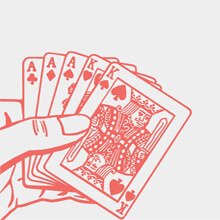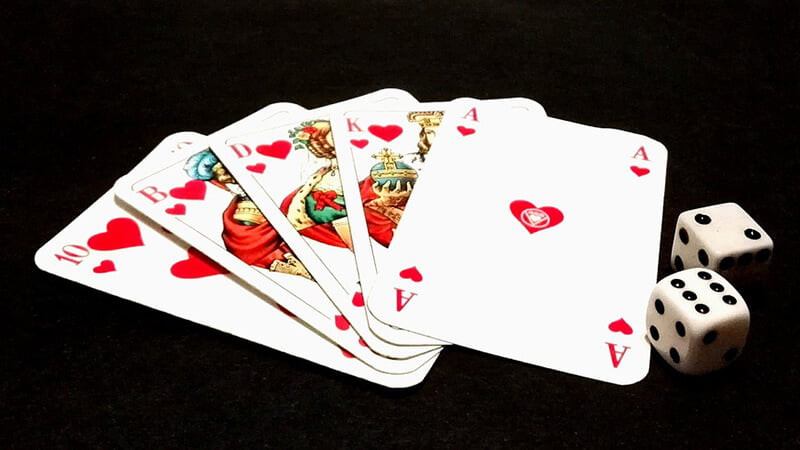
Poker Pot Equity
- Understanding poker pot equity pays off in the long term
- An odds calculator will crunch the numbers for you
- It is important to understand the basics of poker pot equity to have a long-term advantage
When you are playing online poker, a firm knowledge of the theory of poker pot equity is extremely important. In short, this is the part of the game that includes mental aspects and mathematical considerations. It gives you an idea of the reasons why you might put out a bet in a certain situation or check in another situation. In the most simplistic sense, poker pot equity refers to the portion of the combined pot that should be yours based solely upon your chances to win the hand at any time during play.
To further illustrate this point, let’s consider an example. You are holding Ah-Kh before the flop and we have the working knowledge that one of your opponents has Jh-Ts. Let’s consider, for the sake of explanation, there is about $30 to be won in the pot. A simple check of a basic poker odds calculator will let you know that you have a 65% chance to win the hand with your hole cards. This is assuming the hand is played to the end, with neither player laying down their hand. In this case, we would have equity of 65% of the pot, which is $30. This comes out to $19.50. It is important to understand that this is your pot equity only during that part of the hand. When more cards are dealt to the board, the pot equity for each player will change.
Let’s consider in this example that the flop comes out Jh-Tc-2h. Though you might have had a great chance of winning the hand prior to the flop, your pot equity will no longer be the same now the flop has come. If you use the same odds calculator to figure out the chances of winning the hand at this point, you now have a 22% chance of taking down the pot. You will notice that your poker pot equity has decreased dramatically based upon the order of the cards, which is something that is important to understand about the concept. There is still an opportunity to make the best hand, though. For instance, is the turn card is Qs, your odds of taking down the pot will once again increase dramatically. From here, there are only a few cards in the deck that could give your opponent the best hand.
You might be wondering how the odds calculator works and why you might need to use it. In short, it does all of the work for you. Instead of having to crunch numbers in your head and figure out what choice to make, an odds calculator uses computer technology to run simulations on hand hundreds or even thousands of times in order to come up with a comprehensive number on what your chances are. This is something that can add to your online poker ability and help you figure out your hand equity, as the odds of winning a hand are the same number as your poker pot equity.
Now that you have an idea of all of these numbers and calculations, you need to know how to apply them in your game. If you don’t know how to incorporate the idea of pot odds and poker pot equity into your game, then the knowledge of the pot odds themselves is fairly useless. The answer to this question of application is fairly ambiguous, as it’s not possible to ever know with 100% certainty what two cards your opponent has. Simply put, you can’t sit down at an online poker table, even with all of the tools and calculators, and figure out exactly what your poker pot equity is. This is a poker principle that you always have to keep in mind though, especially when evaluating your play over the long haul. If you always have in mind what sort of equity that you think you have, then you will end up making better decisions and saving your bankroll.

Poker Pot Equity and the Maths Involved
Let us consider a practical application of poker pot equity in order to help improve your game. Poker pot equity is important in helping you determine the course of action that you will take in terms of value betting. When you have good poker pot equity, you will be betting in order to try to increase the size of the pot. Consider the hand that I mentioned earlier. In that hand, you hold the best possible straight after the queen falls on the turn. Because of that, your 91% pot equity dictates that you will win 91 cents for every dollar that gets fed into the hand. With that it mind, it is up to you to make sure that you maximise the size of the pot. This means that you will be putting in value bets in order to get your opponents to make a call instead of folding their hand.
As with most hands, there is a slight possibility that the river card could be bad news for your hand. It could give your opponent a better hand when he or she hits a full house. This doesn’t matter when considering our poker pot equity at the turn. Even though there is a slight chance that we could be feeding money into a losing pot, there is an even greater chance you are putting more money into a pot that you will win. When you feed more money into this potentially winning pot, you will maximise your chances to win over the long haul. You can’t pick and choose spots when working with this theory. You have to be consistent in getting your money in when you have the best hands.
When thinking of poker pot equity, it’s important to consider pre-flop moves. You should come out firing and raising when you have the best hand pre-flop because more times than not, this will lead to you getting the most money into the pot when you have the best hand after the flop. There are plenty of other reasons why raising before the flop is a good strategy. You can reduce the number of players that you’re competing against and you will also put pressure on the other players to have to react to your moves instead of being able to dictate play at their pace.
In closing, there are a few things to remember when it comes to poker pot equity. The basic mathematical principles that back up pot equity must be understood if you are going to play winning poker over the long haul. Though you will sometimes get drawn out against and you will sometimes lose a hand when you shouldn’t, you’ll come out ahead in the long run if you put in bets with the best hand.